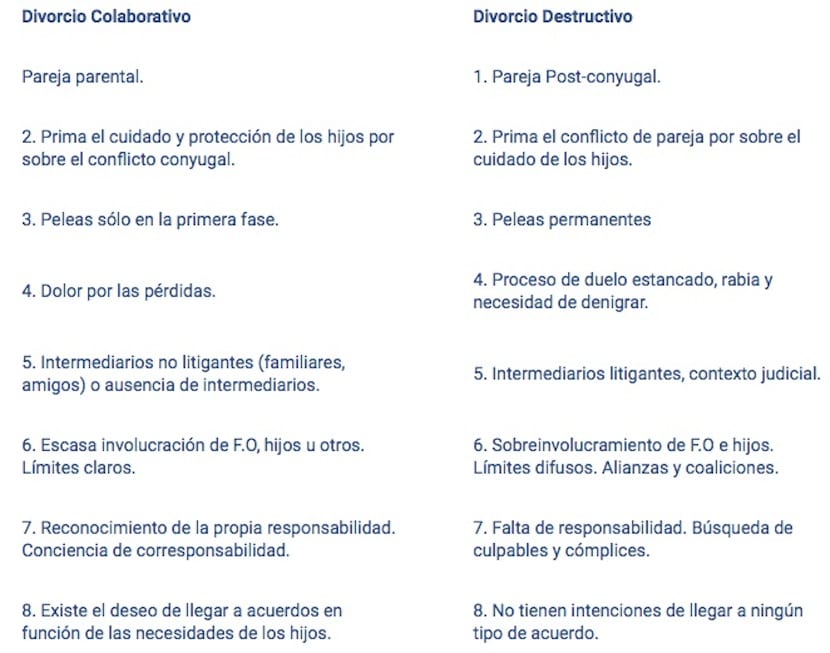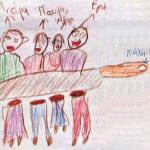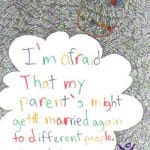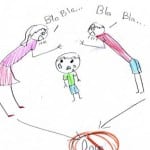
Data from the National Institute of Statistics tell us that in 2014 (for 2015 it has not yet been published in this regard) the rate of sentences for annulments, separations and divorces was 2,3 per 1000 inhabitants, which is equal to a total of 105.893 cases. Divorces represent 95,1 percent of the total; and if we look at them together with the separations, 76,5% were by mutual agreement. When comparing with the previous year (2013) we find a percentage difference of 5,4 percent, which would confirm that each year separations or divorces increase, many of these marriages have children.
Different sources consulted affirm that 30% of marriages end in separation or divorce, a very high figure, although lower than that 40 percent in the United States. In any case, these are important figures, which leads us to reflect on how these processes affect children, when the family has had offspring; because - although - it is accepted that the members of the couple can perceive personal improvements with the change of life, for their children it will become a very complicated situation if their emotions are not taken care of and they are not kept informed.
We have come across a post (I mention it at the bottom of the page) in which different sources have been consulted, and shows different drawings made by children, whose parents are separating, or have already done so. As you can see in the gallery of images, in general they feel helpless and above all it gives the feeling that they perceive their life as 'split' in two. But I have bothered to review the abundant documentation on it, and it seems that in the experience of children the situation matters as much as the factors that accompany it.
Destabilizing factors.
The estrangement of the parents, the endless fights, the loss of purchasing power, changes of residence and separation from the social environment, forced cohabitation with one of the parents, lack of interaction with the other parent, new partners of the parents.
All of this directly includes children experiencing relationship problems with their peers, psychological or emotional consequences such as fear or depression, behavior problems, and even drop in academic performance. Even so, a separation or divorce is not a cause per se of psychological problems in children, but it makes them more vulnerable, at least that is how it appears from this study published by Vangyseghem and Appelboom, in 2004.
Emotional reactions according to age.
Preschoolers.
The appearance of regressive behaviors, which many children experience as they grow up, should not be surprising, even if they do not experience a separation: among them we can mention nocturnal enuresis, the need to be helped to eat as if they were smaller; It could also be that they manifest physical pain. Other consequences are introversion or disturbed sleep.
The little ones can feel guilty, and that is very dangerous, the fear of abandonment appears
Between 6/7 years and the end of Primary Education: 12 years.
Experts agree that it is the stage of greatest vulnerability
There are children who try manipulate and attempt emotional blackmail in order to get their parents back together; In addition, their self-esteem suffers a lot and it is possible that they show aggressive behaviors. A lower academic performance indicates that the child is having problems derived from the situation, and they should be paid close attention.
Teenagers.
To the hormonal, neurological, social changes ... (of all kinds) that girls and boys go through from the age of 10, a destabilizing situation is added, also coinciding with the process of becoming an adult, everything gets complicated.
They also suffer from fear of loneliness and abandonment, and thoughts appear that make them doubt their ability to commit to life with other people.
Next, I show a table prepared by the Belén Foundation in which they are clearly appreciated the differences between a collaborative divorce and a destructive one, although they are (important) nuances that we will expand on later.

We have realized when addressing the issue, that there are still loose ends, so In the next few days we will present recommendations to facilitate the experience of the little ones of the house, and we will also delve into a current issue: shared custody.
Via - Voz Pópuli
Image - (Cover) tonzpalmer24
Table - Belén Foundation



